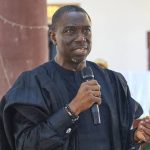Broadband would create jobs, says Juwah
 Government involvement in broadband
Government involvement in broadband
Government is ready now to come into it, you know NCC has always had an initiative and now Government has come in and both the Ministry of Communication Technology and NCC have aligned their initiatives to correspond, so if you look at the broadband plan it’s aligned also to what NCC has started and we will continue cementing this alignment as we go forward. The important thing is that broadband will aid our economy and as we have been told broadband is like electricity in the olden days, it will oil the economy, it will improve the knowledge of Nigerians, it will contribute significantly to our development.
Leveraging on other countries’ stories
Most of the things we’re doing now are on broadband because we want to fine tune our initiative, we want to fine tune our plans, our framework especially the regulatory aspect because the regulators are going to control what’s going to happen so we need to have experiences from people that have done it before. The Commonwealth Telecommunications Organisation (CTO) is coming to Nigeria with 20 foreign ministers together with their experts in October and then we go to Bangkok in November. During these two major events, we will also discuss with international community what we’re doing and gain from their experience.
Is the broadband plan feasible?
Of course, it has been aligned with the very practical objective that NCC had and it spells out clearly what each agency is supposed to do and so on and so forth. It is implementable and it is going to be implemented within those time lines, I believe so.
Involvement of too many agencies
Yes, definitely, it is a cooperative thing, we as regulators have very central role to play and if you look at that broadband plan, especially as to tasks and agencies to perform them you’ll see that NCC is very prominent there.
So, are you ready to run with it?
I’m ready to run with the plan, it is central to the President’s transformation agenda. We have been saying that since I came to NCC that this broadband will contribute tremendously to the transformation agenda of the president, the president also realizes it, you could see his enthusiasm in getting it off the table, and we as one of the key agencies to implement it, we are ready to run.
Role of the federal government
The Government will still have to approve it, but if you look at the plan there are indications there that we will discuss with the ministry of finance representing the federal government to look at ways of funding it or subsidize it or more appropriately on how to give incentives to the private sector to have their buy in into the plan.
What makes you optimistic?
We have done well in voice market. For five successive years Nigeria was the fastest growing mobile market in the whole world, we want to repeat the same performance in broadband, people that have invested in the Nigerian telecom market, some reluctantly, are now smiling to the bank, so we hope very much that broadband will become the next revolution in communication in Nigeria, and will also fetch the same type of profitability for companies that are willing to come and invest.
Why so much noise about broadband?
You have seen that the modern economy can’t run without broadband whether it is broadcasting, whether it is medicine, whether it is government services, so the more we delay, the more we fall behind, especially in improving the knowledge of our children. The children these days don’t depend on teachers to teach them through blackboards and so, they have to learn on their own, you’ll be surprised to know that 12 years old children get to learn very complicated things even to the standards in the university because they can access this information on their own and then learn at their own pace according to their interest. So, it is very fundamental that Nigeria embarks on this because Mr. President wants development, wants to transform Nigeria, you can see that he is keen on getting this up there.
Broadband and cybersecurity
Cyber security is in many forms and it is being addressed, the Bills for them are before the National Assembly and we are pushing, fine tuning with the National Security Adviser’s (NSA’s office) to see that it takes off this year. So the issue of cyber security is not being overlooked at all it is going to go hand in hand with access to information through broadband.
How much of your six-point agenda have you achieved?
I am about half way now and I can say that I have done about seventy percent of what I want to do, I have about thirty percent to do in the remaining two and a half years during my tenure and I’m looking forward to completing them. I’m doing more, a little bit more so I hope by the time my tenure is up in 2015, I’ll come to you people to score myself and I’ll be happy if you people will concur.
Your approach to regulation
Nigeria is a difficult terrain, when we came ,we wanted actually to pursue a low intervention regulation which is the modern regulation, but you see that in Nigeria market, competition is fierce and the market is not really ready for what they call self-regulation and that’s why you have seen more intervention from us recently and you know we had to intervene based on the mandate that NCC has and that’s why you see also that there’s no resistance from the industry on our intervention rule because we take time to interview them and we do get criticized by customers and so on and so forth but you’ve got to get it right and we have always got it right. That’s why the stakeholders are not taking us too common, they have very powerful lawyers and they have the resources to challenge us, but when they see that we are on the right side of the law, you see them back off and that’s what has been happening. At NCC, every of our action is guided by law. We have remained a lawful, responsible and responsive agency and as I speak to you now, we have come to represent the benchmark in telecom regulation for many countries across the world.
You have done three key things: slashed SMS price, introduced Mobile Number Portability and undertaken SIM card registration. Why?
And also we brought down the wholesale price of services, something that is called the interconnect rate, we brought them down significantly and we’re looking forward to these gains being passed on to subscribers. That means the overall retail price is coming down, that’s a very key thing that we have done apart from the other three you mentioned, this is all we have promised to do, we have done them all now. And once we round off on SIM card registration, starting at the end of June (last month), then we will be left with implementing our broadband initiative, we will do this until the end of my tenure.
Performance of GSM
GSM has done tremendously well, people just knock it for nothing. GSM has created jobs more than any other industry we have had, and we have to speak this out so that people know. In our economy today, telecommunications is the fastest contributor to our economy, it’s the fastest growing sector, you heard the Minister of Finance the other day attest to this. There have been difficulties, difficulties because of the fast growth, we grew so fast that capacity could not keep up with demand, but we are in the fight to beef up capacity and even with the difficulties in services, you see jobs are being created, businesses are being created around this, so we are not ashamed to give ourselves pass mark in GSM, it’s been a difficult terrain, there have been difficulties, there have been attacks on facilities, there have been difficulties with power, vandalisation, all this contributed and these things are beyond the purview of the regulator or even the operators. Despite all this, positive contributions have been made to our economy and we are hopeful that all these difficulties will soon be cleared.
Light at end of tunnel?
We’re looking towards the end of the year, the operators are adding capacity under monitoring and enforcement of the NCC, we don’t have to broadcast everything we do in newspapers or the television but we are on their neck and they are responding and the issue of quality of service will disappear, even now they have started disappearing. I can name a few countries we are better than, a few well developed countries where our quality of service scores better, so we are looking forward to better success.
Looking back, looking forward
I’m looking forward to helping to ginger up the broadband revolution, it has been sometime in coming because a strategy has to be put together which has now been put together by the Ministry of Communication Technology and clearly functions have been defined, this wasn’t there before. Now we’re ready to run and we’re going to run.
Implication of broadband
The direct implication is that broadband deployment is that it would open up the economy, easy the process of doing businesses from banking o medicine to education and even government. All aspects of life would be positively affected. More jobs would be created and Nigerians who are into content development like software, movies and music would find a very good platform to market their products. Quality of service would improve and data and video management would improve too. On the long run, price of telecom services from voice to data would crash and those who are hitherto digitally excluded would be included because the services would be pervasive. So, it is a win-win for Nigeria and Nigerians.








